UPWELLING CASE: Difference between revisions
From WikiROMS
Jump to navigationJump to search
No edit summary (change visibility) |
No edit summary (change visibility) |
||
| Line 2: | Line 2: | ||
The upwelling/downwelling example was contributed by Anthony Macks and Jason Middleton (Macks, 1993) and consists of a periodic channel with shelves on each side. There is along-channel wind forcing and the Coriolis term leads to upwelling on one side and downwelling on the other side. If you run it for several days without vertical mixing, you end up with dense water over light water. | The upwelling/downwelling example was contributed by Anthony Macks and Jason Middleton (Macks, 1993) and consists of a periodic channel with shelves on each side. There is along-channel wind forcing and the Coriolis term leads to upwelling on one side and downwelling on the other side. If you run it for several days without vertical mixing, you end up with dense water over light water. | ||
{|width="99%" | |||
|style="width:20%"| | |||
'''Day 0''' | |||
|style="width:20%"| | |||
[[Image:t_his_0.png|none|thumb|180px|<center>Temperature</center>]] | |||
|style="width:20%"| | |||
[[Image:uvel_his_0.png|none|thumb|180px|<center>U-velocity</center>]] | |||
|style="width:20%"| | |||
[[Image:vvel_his_0.png|none|thumb|180px|<center>V-velocity</center>]] | |||
|style="width:20%"| | |||
[[Image:wvel_his_0.png|none|thumb|180px|<center>W-velocity</center>]] | |||
|style="width:20%"| | |||
[[Image:omega_his_0.png|none|thumb|180px|<center>Omega</center>]] | |||
|- | |||
|style="width:20%"| | |||
'''Day 1.5''' | |||
|style="width:20%"| | |||
[[Image:t_avg_1.5.png|none|thumb|180px|<center>Temperature</center>]] | |||
|style="width:20%"| | |||
[[Image:uvel_avg_1.5.png|none|thumb|180px|<center>U-velocity</center>]] | |||
|style="width:20%"| | |||
[[Image:vvel_avg_1.5.png|none|thumb|180px|<center>V-velocity</center>]] | |||
|style="width:20%"| | |||
[[Image:wvel_avg_1.5.png|none|thumb|180px|<center>W-velocity</center>]] | |||
|style="width:20%"| | |||
[[Image:omega_avg_1.5.png|none|thumb|180px|<center>Omega</center>]] | |||
|- | |||
|style="width:20%"| | |||
'''Day 2''' | |||
|style="width:20%"| | |||
[[Image:t_his_2.png|none|thumb|180px|<center>Temperature</center>]] | |||
|style="width:20%"| | |||
[[Image:uvel_his_2.png|none|thumb|180px|<center>U-velocity</center>]] | |||
|style="width:20%"| | |||
[[Image:vvel_his_2.png|none|thumb|180px|<center>V-velocity</center>]] | |||
|style="width:20%"| | |||
[[Image:wvel_his_2.png|none|thumb|180px|<center>W-velocity</center>]] | |||
|style="width:20%"| | |||
[[Image:omega_his_2.png|none|thumb|180px|<center>Omega</center>]] | |||
|} | |||
Revision as of 19:28, 18 July 2008
Wind-Driven Upwelling/Downwelling over a Periodic Channel Test Case
The upwelling/downwelling example was contributed by Anthony Macks and Jason Middleton (Macks, 1993) and consists of a periodic channel with shelves on each side. There is along-channel wind forcing and the Coriolis term leads to upwelling on one side and downwelling on the other side. If you run it for several days without vertical mixing, you end up with dense water over light water.
|
Day 0 |
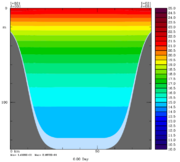 |
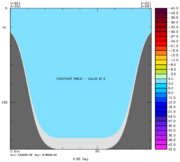 |
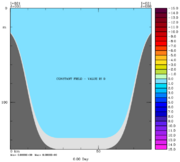 |
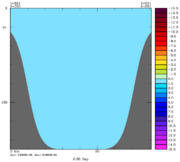 |
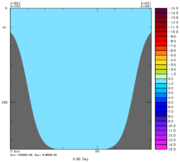 |
|
Day 1.5 |
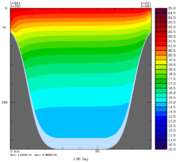 |
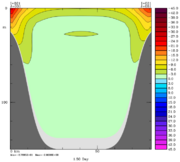 |
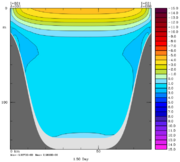 |
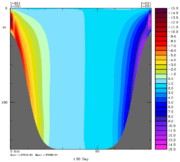 |
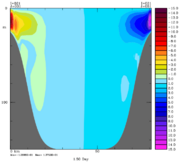 |
|
Day 2 |
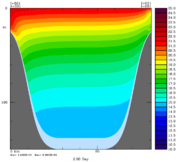 |
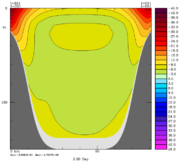 |
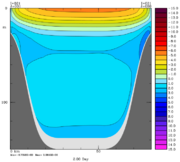 |
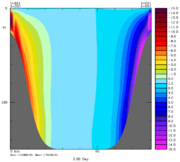 |
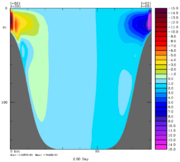 |